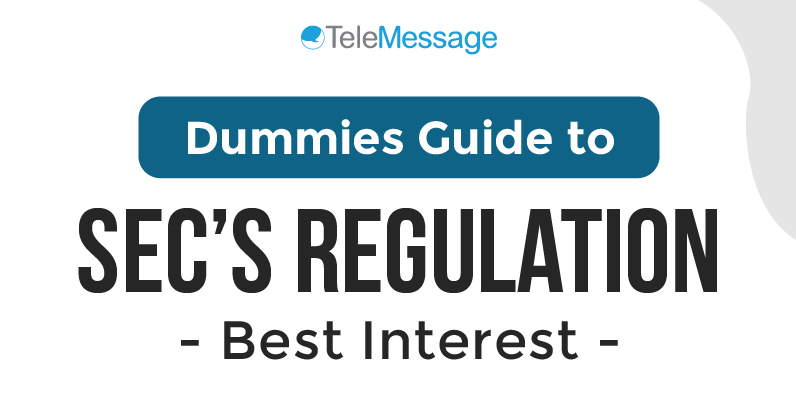In June 2019, the Securities and Exchange Commission passed the Regulation Best Interest (BI).
Considered as the biggest update to suitability regulation in the past two decades, Regulation BI now requires broker-dealers to act in the “best interest of their clients. This to emphasize that a broker-dealer should not put their financial interest ahead of the interest of a retail customer when making recommendations.
With this new regulation in force, compliance officers are tasked to develop oversight, monitoring, testing, and inspections procedures to ensure that the program implementation is being followed by all broker-dealers under their jurisdiction.
Who Must Comply with Regulation BI?
Broker-dealers and natural persons who are associated persons of a broker-dealer (associated persons) making a recommendation of any securities transaction or investment strategy involving securities (including account recommendations) to a retail customer are required to comply with Regulation BI.
The effective date for Regulation Best Interest is September 10, 2019. The compliance date is June 30, 2020.
What is Considered a Recommendation?
Factors considered in determining whether a recommendation has taken place include whether the communication “reasonably could be viewed as a ‘call to action’” and “reasonably would influence an investor to trade particular security or group of securities.”
The more individually tailored the communication to a specific customer or targeted group of customers about security or group of securities, the greater the likelihood that the communication may be viewed as a “recommendation.”

Key Regulation BI Obligations
Regulation BI is comprised of the following four obligations that firms must satisfy to stay compliant:
- Disclosure Obligation– Requires Broker-Dealers and associated persons to provide to retail customers, before or at the time of the recommendation, in writing, full and fair disclosure of all material facts related to the scope and terms of the relationship and all material facts relating to conflicts of interest that are associated with the recommendation.
- Care Obligation – Broker-dealers and associated persons must exercise reasonable diligence, care and skill in making a recommendation to understand the associated potential risks rewards and costs, have a reasonable basis to believe the recommendation is in the best interest of the customer and have a reasonable basis to believe that a series of recommended transactions is not excessive.
- Conflict of Interest Obligation – Broker-dealers must identify and at a minimum, disclose or eliminate all conflicts of interest associated with such recommendations and mitigate certain identified conflicts, assuming that those conflicts were not otherwise eliminated.
- Compliance Obligation – Broker-dealers must consider the nature of that firm’s operations and how to design such policies and procedures to prevent violations from occurring, detect violations that have occurred, and to correct promptly any violations that have occurred.
Regulation BI and Amended Recordkeeping Requirements
The SEC amended Exchange Act Rules 17a-3 and 17a-4 to require firms to create and preserve records for obligations imposed by Regulation BI.
- 17a-3(a) (35) For each retail customer to whom a recommendation of any securities transaction or investment strategy involving securities is or will be provided: (i) A record of all information collected from and provided to the retail customer…as well as the identity of each natural person who is associated, if any, responsible for the account.
- 17a-4(e)(5) – All account record information required pursuant to § 240.17a-3(a) (17) and all records required pursuant to § 240.17a-3(a) (35), in each case until at least six years after the earlier of the date the account was closed or the date on which the information was collected, provided, replaced, or updated.
How Can a Compliant Mobile Solution Help Broker-Dealers with Regulation BI?
- Establish and Maintain a Pre-Approved Communications Library – Broker-dealers can access a library of pre-approved communications to ensure that all materials sent to clients serve their best interests.
- Audit Trail – Having an archive of all client communications will serve as proof that the broker-dealer has indeed served their client’s best interest.
- Compliant Data Retention – With a unified mobile archiving database for sent and received mobile communications with clients such as mobile SMS, WhatsApp chats, voice calls, IMs, and emails, broker-dealers can ensure that all correspondences relevant to Regulation BI compliance is stored in compliance with SEC’s standard.
The TeleMessage Mobile Archiver effectively addresses compliance, regulatory, eDiscovery response requirements and reduces risks across the financial industry. TeleMessage captures and records mobile SMS, MMS, voice calls, social media, and WhatsApp Chats from corporate or BYOD mobile phones, and flags any content or messages that indicate suspicious activities as well. Messages are securely and reliably retained within TeleMessage servers or forwarded to an archiving data storage vendor of your choice.
Our mobile archiving products securely capture content from mobile carriers and mobile devices for a variety of ownership models (BYOD, CYOD, and employer-issued). With our multiple archiving methods, you can always find the right tools or blend for your text message archiving and voice call recording requirements:
TeleMessage offers cross-carrier and international mobile text and calls archiving for Corporate and BYOD phones. Visit our website at www.telemessage.com to learn more about our mobile archiving products today.



